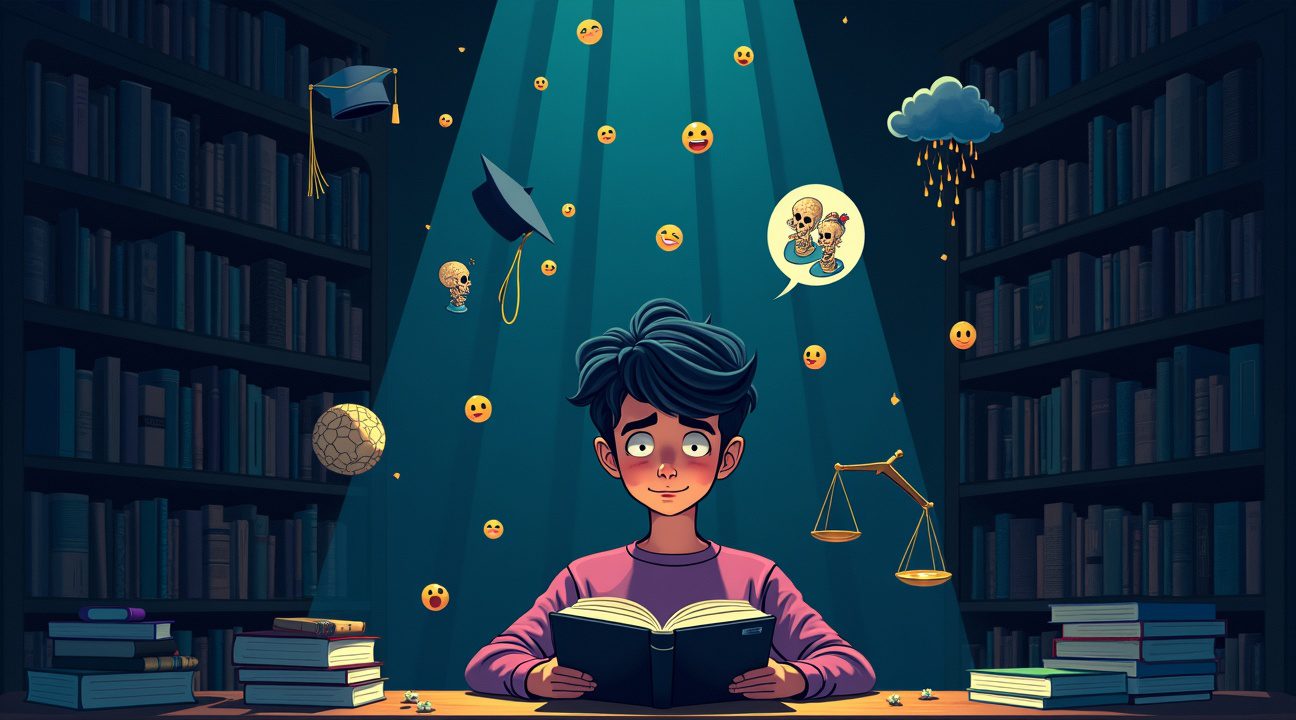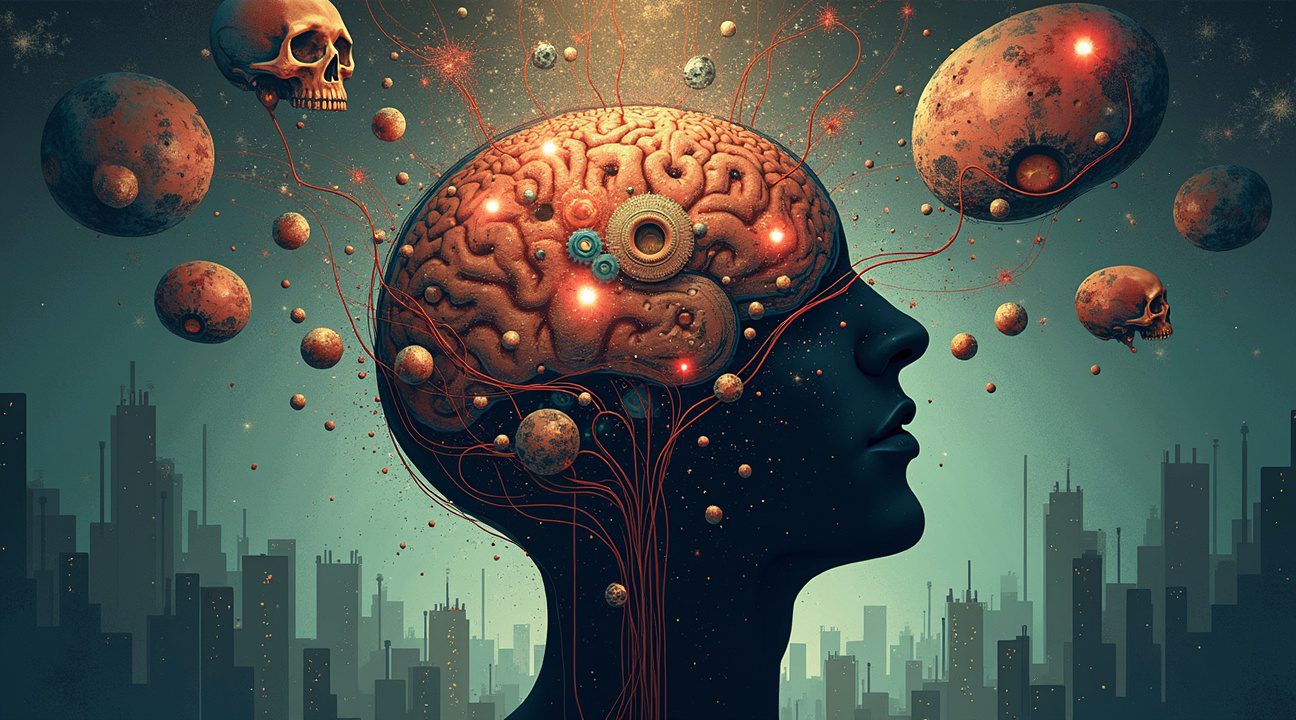A groundbreaking study by the Medical University of Vienna reveals that those who appreciate dark humor consistently outperform their peers on intelligence tests and exhibit higher emotional regulation than individuals who prefer more conventional comedy.
Key Findings from the Study
- Higher Intelligence Scores: People who understand and enjoy dark humor score significantly higher on standardized intelligence tests, with notable correlations in both verbal and nonverbal cognitive abilities.
- Complex Cognitive Processing: Dark humor appreciation requires sophisticated mental processes, including the ability to balance contradictory emotions, recognize societal taboos, and maintain emotional detachment.
- Lower Aggression: Individuals who prefer dark comedy demonstrate lower levels of aggression and fewer mood disturbances, challenging the belief that dark content fosters negativity.
- Educational Influence: Higher educational attainment strongly correlates with dark humor preferences, suggesting that exposure to complex material and critical thinking contributes to appreciation for nuanced comedy.
- Emotional Stability: Stable emotional states appear essential for processing dark humor, as high aggression or mood disorders can interfere with cognitive flexibility needed to enjoy controversial content.
Deconstructing the Results
The study, published in the Cognitive Processing Journal, challenges outdated assumptions about dark humor enthusiasts. A total of 156 adult participants were evaluated using the Black Comedy Scale, comprehensive intelligence assessments, and personality inventories. Results consistently revealed that those who excel in understanding dark humor also demonstrate exceptional cognitive abilities across multiple domains.
Cognitive Agility Behind Dark Humor
Processing dark humor isn’t a passive experience. The brain must juggle recognizing social boundaries, interpreting emotionally provocative content, and maintaining psychological distance. This mental juggling requires high levels of executive functioning and strong working memory—traits that contribute to enhanced performance on conventional intelligence measures.
Emotional Maturity Among Dark Comedy Fans
Contrary to stereotypes, fans of dark humor tend to exhibit higher emotional control. These individuals scored lower on aggression indices and reported fewer symptoms of mood instability compared to fans of more mainstream comedy. This discovery suggests that dark humor consumption stems from emotional maturity, not dysfunction.
The Role of Education and Exposure
Participants with advanced academic degrees consistently rated dark comedic material more favorably than those with only basic educational backgrounds. This link highlights the importance of educational exposure in cultivating appreciation for sophisticated humor, which often involves analysis, critical thinking, and cultural awareness.
Implications for Society and Mental Development
The Vienna study’s revelations carry powerful implications across various domains—from psychology to education and content creation. Comedy writers may consider dark humor a high-engagement genre for intellectually curious audiences, while psychologists and educators might use humor preferences as a potential marker for cognitive and emotional traits.
Moreover, the study suggests that exposure to dark comedy could potentially act as a cognitive exercise. By regularly engaging with this complex form of humor, individuals may improve both mental flexibility and emotional self-regulation.
Dark Humor Fans Score Higher on Intelligence Tests and Show Superior Emotional Control
Researchers at the Medical University of Vienna have uncovered compelling evidence that individuals who appreciate dark humor possess superior intellectual capabilities and enhanced emotional regulation. I find this fascinating because it challenges common assumptions about what constitutes sophisticated thinking.
Intelligence Testing Reveals Significant Correlations
The study examined 156 adults and measured their responses to black humor—specifically defined as humor addressing sinister topics like death, disease, deformity, handicap, or warfare through comedic lenses. Participants who demonstrated both comprehension and appreciation for this type of humor consistently outperformed their peers on standardized intelligence assessments.
The data published in the Cognitive Processing Journal shows remarkable correlations between dark humor appreciation and cognitive ability. Black humor comprehension correlated significantly with nonverbal intelligence (r = 0.177, p = 0.027) and verbal intelligence (r = 0.158, p = 0.049). These statistical relationships suggest that processing complex, often uncomfortable comedic content requires advanced mental faculties.
Educational attainment data further supports these findings. Individuals who scored highest on dark humor appreciation tests typically possessed higher levels of formal education, indicating a pattern that extends beyond simple test performance into real-world academic achievement.
Emotional Stability Creates Surprising Benefits
Perhaps most intriguingly, the Vienna research team discovered that participants with the greatest appreciation for dark humor exhibited the lowest aggression levels. This finding contradicts popular beliefs that consuming dark content might increase hostile tendencies or emotional volatility.
I think this emotional stability stems from the cognitive demands required to process dark humor effectively. Understanding such content requires separating the shocking subject matter from its comedic presentation—a mental process that demands both intellectual sophistication and emotional distance. Emotional intelligence research suggests this type of cognitive control transfers to other life situations.
The ability to find humor in disturbing topics appears to function as a psychological buffer, allowing individuals to process difficult realities without becoming overwhelmed by them. This emotional regulation skill likely contributes to the superior test performance observed in the study, as anxiety and emotional distress typically impair cognitive function during assessments.
These findings challenge traditional views about humor preferences and intelligence. Rather than indicating poor taste or psychological issues, an appreciation for dark comedy may actually signal advanced cognitive processing abilities and emotional maturity that extend far beyond simple joke comprehension.

What Makes Dark Humor So Demanding on Your Brain
Dark humor presents an intricate cognitive challenge that sets it apart from conventional comedy. I find it fascinating how this specific type of humor forces the brain to simultaneously process contradictory emotional responses while maintaining social awareness. Unlike straightforward jokes that rely on simple wordplay or situational comedy, dark humor exposes tragic or taboo topics—such as death, illness, disability, and violence—in a comically absurd context.
The cognitive demands become apparent when someone encounters a dark joke about mortality or suffering. Their brain must first recognize the serious nature of the subject matter, then identify the comedic elements, and finally reconcile these opposing concepts into a unified understanding. This process requires what researchers call cognitive flexibility—the ability to switch between different conceptual representations and adapt thinking patterns rapidly.
Processing dark humor also demands exceptional emotional control. Individuals must navigate the discomfort of distressing material while simultaneously finding humor in it. This emotional balancing act requires significant mental resources and demonstrates advanced emotional resilience. The brain essentially performs a complex filtering process, separating the humorous intent from the potentially disturbing content.
The Cognitive Complexity Behind the Laughs
The complexity and subtlety inherent in dark humor place strong demands on both cognitive resources and emotional resilience. Movies like Pulp Fiction, A Clockwork Orange, In Bruges, Shaun of the Dead, Lost in Translation, and Fargo exemplify this form of sophisticated humor. These films masterfully blend serious themes with comedic elements, requiring viewers to:
- Understand multiple layers of meaning simultaneously
- Recognize social and cultural taboos being violated
- Maintain emotional distance from disturbing content
- Appreciate irony and absurdity in serious situations
- Process complex character motivations and moral ambiguity
The mental gymnastics required to appreciate dark humor explain why it correlates with higher cognitive abilities. Someone watching Shaun of the Dead, for instance, must reconcile zombie apocalypse horror with British comedy, understanding both the genre conventions being satirized and the emotional investment in character relationships. This type of processing activates multiple brain regions simultaneously, creating a rich cognitive workout.
Research confirms this complexity through controlled studies. In their investigation, researchers utilized Uli Stein’s The Black Book cartoons to examine participants’ reactions to dark humor material. These cartoons presented perfect test cases because they combine disturbing imagery with comedic elements in precisely measured doses. Participants had to decode visual metaphors, understand cultural references, and process emotional contradictions—all while determining whether they found the material funny.
The brain’s response to dark humor involves rapid-fire communication between regions responsible for language processing, emotional regulation, and social cognition. The prefrontal cortex works overtime to manage conflicting emotional signals, while the anterior cingulate cortex helps resolve the cognitive dissonance created by finding something simultaneously disturbing and amusing.
Those who struggle with dark humor often lack either the cognitive flexibility to process contradictory information or the emotional stability to handle distressing content without becoming overwhelmed. They might focus too heavily on the disturbing elements, missing the comedic framework entirely, or they might feel genuine distress that prevents enjoyment.
The sophistication required to appreciate films like A Clockwork Orange or Fargo demonstrates how cognitive abilities directly impact humor comprehension. Viewers must understand violence as both real consequence and satirical device, recognizing the filmmaker’s commentary on society while enjoying the entertainment value. This dual processing creates the perfect storm of cognitive demand that separates casual comedy consumption from sophisticated humor appreciation.
Understanding dark humor’s cognitive demands reveals why it serves as such an effective measure of intellectual and emotional capacity. The brain’s ability to handle these competing demands reflects broader capabilities in problem-solving, emotional regulation, and social understanding.
Dark Humor Lovers Show Remarkably Low Aggression and Mood Problems
Research reveals that people who understand and appreciate dark humor demonstrate significantly lower levels of emotional instability and aggressive behavior. These findings challenge common assumptions about what draws individuals to darker forms of comedy.
Strong Negative Correlation Between Dark Humor and Emotional Problems
The study uncovered compelling statistical evidence linking dark humor appreciation to emotional stability. Black humor comprehension showed a negative correlation with mood disturbance (r = -0.200, p = 0.012), meaning those who better understood dark jokes experienced fewer mood-related issues. Similarly, researchers found that aggressiveness directed at others decreased as dark humor comprehension increased (r = -0.171, p = 0.033).
Preference for dark humor also demonstrated a negative relationship with mood disturbance (r = -0.193, p = 0.016). This pattern suggests that individuals who actively seek out and enjoy dark comedy maintain more stable emotional states than those who don’t appreciate this humor style.
Emotional Stability Enables Dark Humor Processing
The research indicates that emotional resilience acts as a prerequisite for appreciating dark humor rather than a consequence of it. People with lower aggression levels and fewer mood problems appear better equipped to process complex emotional content without becoming overwhelmed or distressed. This ability allows them to find humor in situations that might disturb others.
Those who scored highest in dark humor appreciation consistently showed the least aggression and emotional instability across multiple measures. I find this particularly interesting because it suggests that emotional regulation skills directly influence humor preferences. Individuals who aren’t affected by dysphoric moods or aggressive tendencies can engage with challenging content while maintaining psychological distance.
This emotional stability creates a cognitive buffer that enables proper processing of dark humor’s contradictory elements. People with stable emotional foundations can simultaneously acknowledge the serious nature of dark topics while appreciating the unexpected cognitive twist that creates humor. Understanding how brain potential affects our responses helps explain these individual differences in humor appreciation.
The findings fundamentally reshape how researchers view dark humor consumption. Rather than indicating emotional problems or aggressive tendencies, appreciation for dark comedy appears to signal psychological resilience and emotional intelligence.
How Researchers Tested Dark Humor Intelligence Connection
I discovered that this groundbreaking research employed a carefully structured methodology to examine the relationship between dark humor appreciation and cognitive abilities. The study recruited 156 adult participants who underwent a comprehensive evaluation process designed to measure both their humor preferences and psychological characteristics.
The Testing Framework and Participant Response Patterns
Researchers presented participants with a series of cartoons from Uli Stein’s The Black Book, requiring them to evaluate each cartoon across multiple dimensions. Participants rated their understanding and enjoyment of the material while also assessing specific elements including vulgarity, surprise, and interest levels. This multi-faceted approach allowed researchers to capture nuanced responses rather than simple yes-or-no reactions to dark humor content.
Beyond humor evaluation, participants completed standardized psychological assessments that measured several key areas:
- Verbal intelligence through language-based cognitive tests
- Nonverbal intelligence using visual and spatial reasoning tasks
- Educational background and achievement levels
- Emotional stability by examining mood disturbance patterns
- Aggressiveness through validated behavioral assessment tools
The study’s results revealed fascinating patterns that challenge common assumptions about dark humor enthusiasts. Groups that differed in their appreciation for dark humor also showed distinct differences in aggression levels and mood disturbance, regardless of their intelligence scores. This finding suggests that cognitive abilities alone don’t explain dark humor preferences.
I found the correlation data particularly illuminating. A slight positive correlation emerged between self-directed aggression and dark humor preference (r = 0.160, p = 0.045), indicating that individuals who appreciate dark humor may direct aggressive tendencies inward rather than expressing them externally. This pattern suggests a form of emotional processing that channels potentially destructive impulses through humor appreciation.
Conversely, participants who perceived higher levels of vulgarity in dark humor showed stronger correlations with aggression directed at others (r = 0.223, p = 0.005) and increased mood disturbance (r = 0.196, p = 0.014). These findings indicate that how someone interprets dark humor content may be more revealing than whether they simply enjoy it. Those who focus on vulgar elements appear to experience greater emotional instability and outward-directed hostility.
The research methodology’s strength lies in its comprehensive approach to measuring both cognitive and emotional variables simultaneously. Rather than examining intelligence or humor appreciation in isolation, the study captured the complex interplay between cognitive abilities, emotional regulation, and humor preferences. This approach provides a more complete picture of how dark humor functions within individual psychology.
The statistical significance of these correlations, while modest in magnitude, suggests genuine relationships between humor appreciation styles and psychological characteristics. The researchers’ use of standardized assessment tools ensures that these findings can be compared with other psychological research and replicated in future studies. The study’s design effectively separates different aspects of dark humor response, revealing that understanding and enjoying dark content involves distinct psychological processes from perceiving it as vulgar or offensive.

Why Emotional Stability Unlocks Dark Humor Appreciation
I’ve observed that emotional stability serves as a critical foundation for appreciating dark humor’s complex layers. When aggression and mood disturbances cloud judgment, the cognitive machinery needed to process controversial comedic content becomes compromised. This interference explains why emotionally unstable individuals consistently show reduced preferences for darker comedic material.
The Cognitive Framework Behind Dark Humor Processing
Processing taboo topics within a comedic framework demands sophisticated mental gymnastics that unstable emotional states can’t support. I find that individuals must simultaneously hold contradictory ideas—recognizing something as potentially offensive while appreciating its comedic value. This cognitive juggling act requires emotional regulation capabilities that mood disturbances like depression and dysphoria actively undermine.
The brain’s ability to compartmentalize sensitive content while extracting humor depends on stable emotional processing. When dysphoria or depressive episodes interfere, the cognitive resources needed for this complex task become unavailable. Intelligence scores alone can’t predict dark humor appreciation without considering the emotional stability factor that enables proper cognitive processing.
Emotional Regulation as the Gateway
Greater emotional stability consistently correlates with enhanced dark humor enjoyment because it allows individuals to maintain psychological distance from potentially triggering content. Those with higher aggression scores struggle with this detachment, often taking offense where others find comedy. The ability to regulate emotional responses creates space for intellectual appreciation of taboo subjects presented comedically.
Research demonstrates that emotionally stable individuals can engage with controversial scientific topics more objectively, and this same principle applies to dark humor. Lower aggression levels enable people to approach sensitive material without defensive reactions that block comedic appreciation.
Mood disturbances create cognitive interference patterns that prevent the sophisticated processing required for dark humor understanding. When depression affects cognitive flexibility, individuals lose the ability to shift between serious and comedic interpretations of the same content. This cognitive rigidity explains why emotional stability serves as such a strong predictor of dark humor preferences, often outweighing pure intelligence measures in determining comedic taste.
The Science Behind Why Smart People Love Dark Comedy
I find it fascinating that researchers have identified a direct connection between intelligence and our ability to appreciate dark humor. The findings published in the Cognitive Processing Journal reveal that enjoying twisted comedy isn’t just about having a twisted sense of humor—it actually requires significant mental horsepower and emotional strength.
Cognitive Demands of Dark Humor Processing
Dark comedy places unique demands on our brains that separate it from other humor styles. When I encounter a dark joke, my mind must simultaneously process multiple layers of meaning, recognize social taboos being violated, and understand the incongruity that makes the situation amusing rather than simply disturbing. This cognitive juggling act requires what researchers call high intellectual effort, demanding quick mental processing and sophisticated understanding of social norms.
The brain must work overtime to decode these complex messages. Consider how dark humor often involves:
- Recognizing multiple interpretations of the same statement
- Understanding cultural and social contexts that make certain topics taboo
- Processing conflicting emotions simultaneously
- Maintaining psychological distance from potentially upsetting content
- Appreciating irony and contradiction in uncomfortable situations
Research shows that individuals with higher cognitive capacity excel at this mental gymnastics. They can hold contradictory ideas in their minds without becoming overwhelmed, allowing them to find humor in situations that might leave others feeling confused or distressed. This intellectual flexibility explains why cognitive processing plays such a crucial role in dark humor appreciation.
Educational background strongly correlates with dark humor preferences, according to the Cognitive Processing Journal study. People with higher levels of education consistently show greater appreciation for dark comedy, suggesting that formal learning enhances our ability to process complex, multilayered humor. This educational component reinforces the idea that dark humor appreciation develops alongside intellectual sophistication.
Emotional regulation proves equally important in dark humor enjoyment. While intelligence helps us understand the joke, emotional resilience allows us to process potentially disturbing content without becoming psychologically distressed. I observe that people who enjoy dark comedy possess remarkable emotional stability—they can engage with unsettling topics while maintaining their psychological equilibrium.
This emotional strength manifests as an ability to compartmentalize feelings and maintain perspective when confronted with uncomfortable subject matter. Rather than being callous or insensitive, dark humor enthusiasts demonstrate advanced emotional regulation skills. They can acknowledge the gravity of serious topics while simultaneously finding humor in their absurdity or irony.
The combination of high intelligence and emotional stability creates what researchers describe as psychological well-being. People who appreciate dark comedy aren’t damaged or cynical—they’re actually demonstrating mental agility and emotional maturity. They possess the cognitive tools to understand complex humor and the emotional resources to process it without harm.
Studies indicate that this preference signals broader psychological strengths. Dark humor lovers often display greater creativity, more flexible thinking patterns, and enhanced problem-solving abilities. Their willingness to engage with uncomfortable topics through humor suggests they’re comfortable confronting life’s darker aspects rather than avoiding them.
The research published in the Cognitive Processing Journal confirms that dark humor appreciation serves as a reliable indicator of both intellectual capacity and emotional health. When someone enjoys a particularly twisted joke, they’re demonstrating their brain’s ability to perform complex cognitive operations while maintaining emotional balance.
This scientific understanding challenges common misconceptions about dark humor enthusiasts. Rather than being morbid or psychologically troubled, these individuals represent some of our most intellectually and emotionally capable population. Their humor preferences reflect sophisticated mental processing abilities that extend far beyond comedy appreciation into general intelligence and psychological resilience.
Understanding this connection helps explain why dark comedy continues to thrive despite its controversial nature. Smart, emotionally stable people gravitate toward this humor style because it challenges their minds while providing a healthy outlet for processing life’s more difficult realities.

Sources:
Medical University of Vienna – “Black humor preference and comprehension are positively associated with higher verbal and nonverbal intelligence as well as higher levels of education” (Cognitive Processing Journal)
“Study Shows People With Twisted Senses of Humor Are Smarter, More Stable,” Howard Stern News
“People With This Type Of Humor Are More Intelligent, According To Research,” YourTango
“Dark Sense of Humor Linked to High Intelligence – Study,” Psychologist World


